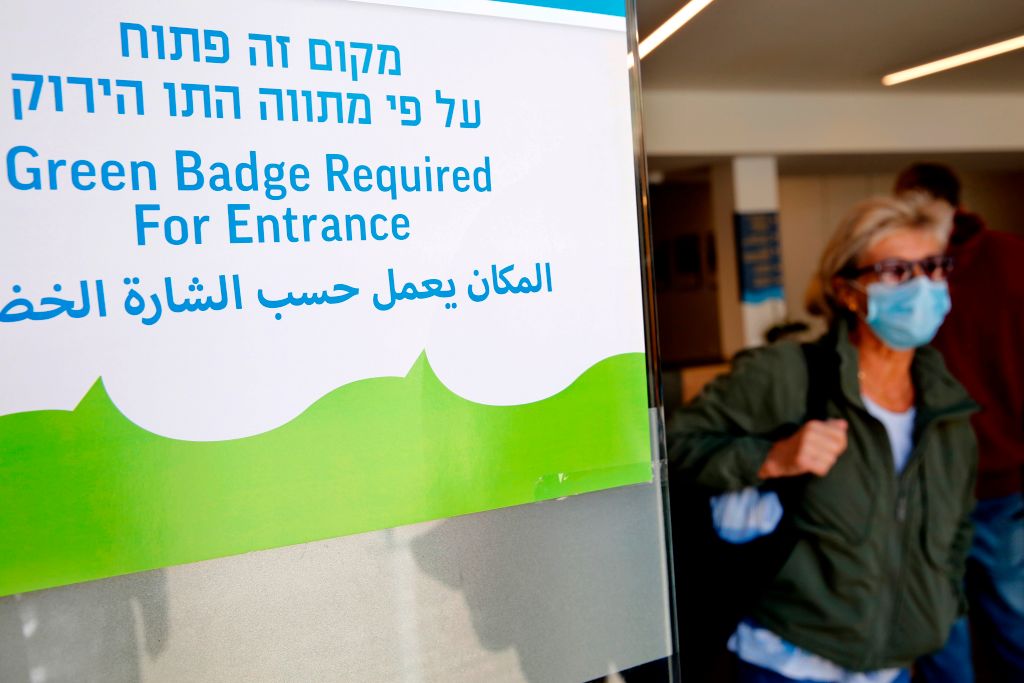Coronavirus rates in Israel right now are among the highest in the world. But that didn’t stop the Israeli government from lifting its strict lockdown and, on Sunday, reopening most of its retail economy.
Non-essential shops, shopping malls, libraries and museums reopened to the general public after being closed for more than six weeks, despite the fact that daily cases and hospitalization numbers remain at pretty much the same levels as when the lockdown began. The streets were packed as people tried to catch up on nearly two months’ worth of shopping.
The reason — or, perhaps, the justification — for this reopening is Israel’s successful vaccination program. An astonishing 90 percent of eligible over-50s have had at least one vaccine dose, and more than half the population now has some immunity against COVID-19. With older people protected and so much risk reduced, it simply became politically impossible to maintain the lockdown, despite some concerns from health officials who wanted another few weeks of restrictions.
But the most interesting event over the weekend was the the launch of the ‘Green Pass’, a government scheme that allows only the vaccinated — and the officially infected and recovered — to go to gyms, hotels and cultural events.
Israel considers anyone who has had COVID-19 to be as protected as a vaccinated person, which is why some can get a Green Pass as long as they can prove they had the virus or have antibodies.
So how does the Green Pass work? The pass itself is a QR code that can be saved and read with an app. Gym owners and event organizers are supposed to check everyone on entry, with fines for violation on both the business and the customer. The Green Pass was originally going to apply to shopping malls too, but there were legal and practical issues: lots of supermarkets and pharmacies are in shopping malls, and unvaccinated people still need to eat.
As with other tech innovations, the rollout has been a bit of a mess: the Health Ministry website for downloading the Green Pass crashed immediately, while the app has yet to be released on iPhone and was broken on Android. But broadly speaking, outside of a small but committed anti-vax population, Israelis are supportive of the Green Pass. About a dozen protesters, almost all women, gathered in a Tel Aviv suburb comparing the Green Pass to the Holocaust and Facebook groups were flooded by activists urging mass civil disobedience. But that was about it.
One quirk of the Green Pass system is that it only applies to the public, not to staff. Gyms and hotels that reopened to the vaccinated are staffed by the unvaccinated, which makes the system feel a little silly at times. Again, this is a legal issue: the Israeli government wants to make vaccination compulsory for certain key workers, such as doctors, bus drivers and teachers, but this will require primary legislation. With a general election coming, nobody wants to rock the boat.
Not everything can reopen just yet. Restaurants and cafes remain closed for another two weeks, and might be restricted to the vaccinated when they open. Large events like wedding parties remain on hold too.
One of the last things to fully reopen will be schools. Younger years are back in class in low-infection areas, and over-16s are back but they’re eligible to get vaccines. The 12-15-year-olds, though, are stuck at home learning on Zoom. They are considered old enough to spread the coronavirus, but too young to get vaccinated. Some big cities, including Tel Aviv, are planning to reopen schools for the 12-15s in defiance of the government.
The vaccine drive also continues. A popup vaccination stand appeared in Jerusalem’s open-air Mahane Yehuda market today, and quickly had a large queue of people.
Even Ikea, which reopened at the weekend, has got in on the act, offering a COVID-19 vaccine to every customer who needs one. Together with the Magen David Adom ambulance service, Ikea superstores are operating as vaccine hubs to try and get jabs in the arms of the hordes who have been waiting for weeks to buy their Billy bookcases and Äpplarö benches. Assembly not required. No Swedish meatballs, though: under the remaining COVID rules, Ikea’s restaurant is closed.
This article was originally published on The Spectator’s UK website.


















